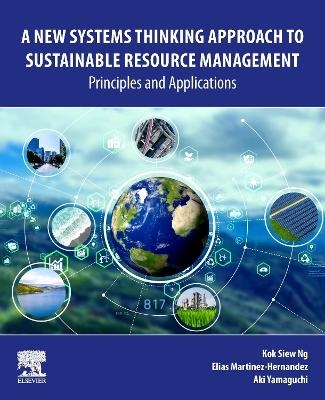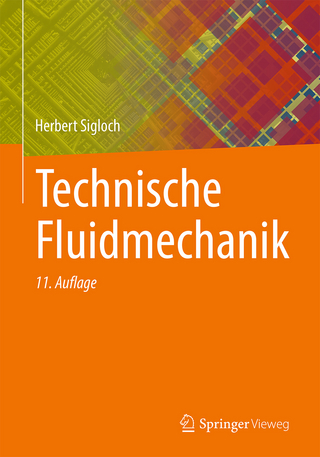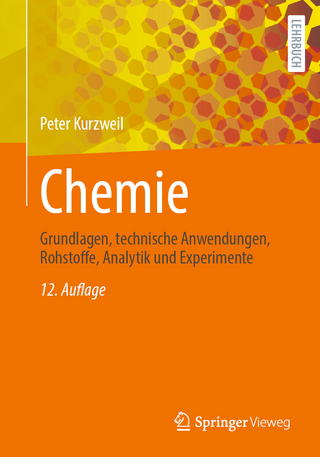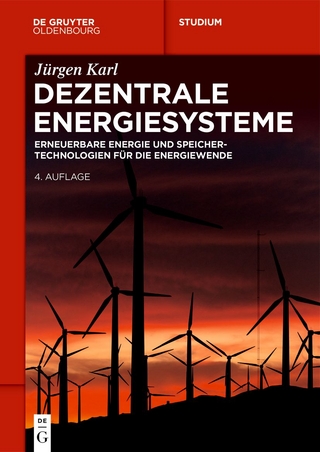
A New Systems Thinking Approach to Sustainable Resource Management
Elsevier - Health Sciences Division (Verlag)
978-0-323-99869-7 (ISBN)
This book covers the fundamental principles of “systems” and ”sustainability”, and introduces the methodology of “new systems thinking,” which comprises system modeling, mapping, integration, analysis, and sustainability assessment. The application of this new systems thinking approach is demonstrated through practical case studies, including waste management systems, food-energy-water nexus, and biorefinery systems. This is an excellent reference for academics, undergraduate and postgraduate students, professional engineers, and policymakers across various disciplines including: chemical and process engineering, environmental science, environmental engineering, and environmental management.
Kok Siew Ng is an Associate Professor of Chemical Engineering who leads the Biorefinery and Resource Recovery research group at Brunel University London, United Kingdom. Prior to joining Brunel, he was an NERC Industrial Innovation (Rutherford) Research Fellow at the University of Oxford, leading two NERC-funded interdisciplinary projects - SYNERGORS and the Agile Initiative. These projects explored innovative strategies to address organic waste management using a systems approach aimed at achieving a circular economy. He received his MEng (1st Class Honors) and PhD in Chemical Engineering from the University of Manchester, United Kingdom. Kok Siew has over 15 years of academic research and industrial consultancy experience. He co-authored an advanced textbook titled Biorefineries and Chemical Processes: Design, Integration and Sustainable Analysis in 2014. He has contributed to over 40 publications and participated in over 10 UK and international projects funded by NERC, EU, Innovate UK, Royal Academy of Engineering, and Newton Fund. Kok Siew’s primary research interests focus on sustainable industrial system design and resource recovery from waste. His expertise spans systems engineering, industrial ecology, process design and integration, techno-economic assessment, life cycle assessment, and policy analysis. He extensively applies a systems approach in his work, combining computational modelling, system integration, and sustainability assessment to design and improve chemical, energy and waste treatment systems, with the vision of contributing to energy transition, promoting the circular economy, and achieving net-zero targets. Kok Siew was the recipient of the IChemE Junior Moulton Medal in 2011, recognizing his forward-looking contributions to the development of low-carbon technologies. He serves as a member of the Editorial Board of Resources, Conservation & Recycling Advances journal. Elias Martinez Hernandez is a Senior Researcher at the Mexican Institute of Petroleum (IMP) in the Energy Efficiency and Biofuels Division. He obtained his first-class degree in Chemical Engineering from UNAM (Mexico) in 2009 and his PhD in Process Integration from the University of Manchester (UK) in 2013. He then worked as a Research Fellow at the University of Surrey and the University of Oxford, and later took up the position as a Lecturer in the Department of Chemical Engineering, University of Bath. He is a recognized scientist by the National Researcher System in Mexico. He has coauthored the textbook Biorefineries and Chemical Processes: Design, Integration and Sustainability Analysis and more than 60 peer-reviewed journal publications. He is an Editorial Board Member of the IChemE’s journal Food and Bioproducts Processing. Elias has led research in digital chemical engineering applied to bioenergy and biorefinery process development, the foodeenergyewater nexus, and more recently in property prediction and process simulation combining neural networks and community detection in molecular and process graphs. He has developed Biorefsysdbiorefinery systems analysis tool; Nexsymda first-of-its-kind foodeenergyewater nexus simulator that has been featured and reviewed in several articles in this field, as well as the IMP Bio2Energyda tool to evaluate the techno-economics of biomass and bioenergy production considering the whole value chain and employing thermodynamic modeling of steam and water properties. Other developments include IMPESda decision support platform for bioenergy implementation and policymaking in Mexico as part of a Newton Fund Impact Scheme project. His areas of research comprise biorefineries, foodeenergyewater nexus, process modeling, life cycle assessment, bioenergy sustainability indicators, modularity, neural networks, and machine learning methods applied in chemical process systems engineering. Aki Yamaguchi is the Climate Change and Energy Policy Officer at the British Embassy in Tokyo. She conducts independent research outside of work. Her research focuses on urban sustainability, circular economy of plastics and food systems, and sustainable resources management. Previously, Aki was a Coordinator for the NERC-funded Sprint projects under the Agile Initiative at Oxford Martin School, University of Oxford, and supported the operation of interdisciplinary science research projects responding to urgent and critical environmental policy needs. Prior to this role, Aki focused on the nexus between environmental policy and development at national and international levels. She managed projects at UNESCO, OECD, and UNEP in the areas of water resources management, financing urban water supply and sanitation, sustainable waste management, urban resilience, and the circular economy. She has coauthored/contributed to publications including the following: Towards Sustainable Municipal Solid Waste Management in Malaysia (Oxford University and Brunel University London, 2023), Guidelines for Performance-Based Contracts in the Urban Water Sector in Eastern Europe, Caucasus and Central Asia (OECD, 2004), and Environmental Priorities for China’s Sustainable Development, in China in the World Economy: The Domestic Policy Challenges (OECD, 2002). Aki has an MA in Environment and Development from the School of Oriental and African Studies (SOAS), University of London. This publication is in not affiliated with the British Embassy Tokyo or the UK government and was written and submitted in a personal capacity.
Part 1: Introduction to Systems Thinking for Resource Management
1. What is a “System”
2. A New Systems Thinking Approach to Sustainable Resource Management
Part 2: System Definition, Mapping, and Integration
3. Problem and System Definitions
4. System Modelling and Mapping
5. System Integration
Part 3: Integrated Sustainability Assessment
6. Economic Assessment
7. Environmental Assessment
8. Social Assessment
Part 4: Applications of New Systems Thinking Approach to Resource Management
9. Case Study 1: Plastic Packaging System
10. Case Study 2: Food-Energy-Water System
11. Case Study 3: Biorefinery System
| Erscheinungsdatum | 21.08.2024 |
|---|---|
| Verlagsort | Philadelphia |
| Sprache | englisch |
| Maße | 191 x 235 mm |
| Gewicht | 450 g |
| Themenwelt | Naturwissenschaften ► Chemie ► Technische Chemie |
| Technik ► Umwelttechnik / Biotechnologie | |
| ISBN-10 | 0-323-99869-0 / 0323998690 |
| ISBN-13 | 978-0-323-99869-7 / 9780323998697 |
| Zustand | Neuware |
| Informationen gemäß Produktsicherheitsverordnung (GPSR) | |
| Haben Sie eine Frage zum Produkt? |
aus dem Bereich


